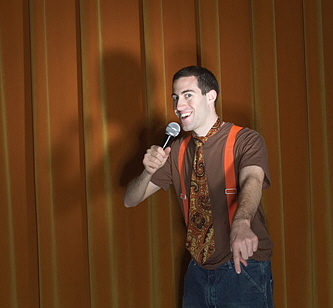






 |
||||
 |
 |
 |
 |
 |
 |
||||
|
F E B R U A R Y 2 0 0 6 I S S U E The Big Question
|
|
|
Adam Ruben, a fifth-year graduate biology student and a
stand-up comedian, teaches the
intersession course, The Stand-Up Comic in
Society. Photo by John Davis |

Q:
Can Funny Be Taught? "Tricks can be taught to facilitate being funny. You can't easily teach someone to change their nature, but you can teach them to recognize the best parts of it more readily and to shape the thoughts they're producing and to put them into a format of a particular style, like stand-up or written comedy. "One thing I teach in my class is that comics, by their very presence, are proof of their own authenticity. People would rather hear about something that happened to you — it's the same reason reality television is popular. So if you have a story you want to tell, and it never happened to you, you just pretend, you throw in some details that make it slightly more immediate. For example, in my routine, I tell jokes about my dog, and I've never had a dog. But the stakes are higher if I'm talking about myself. In Japan, there's a device that, if you put it on a dog's collar, supposedly translates what the dog is saying. So I say, 'I have a friend in Japan, and he sent me one of these devices. I clipped it on my dog's collar, and now he speaks Japanese.' In truth, I know the collar thing exists, but I don't even have a friend in Japan. But telling a story in the third person isn't as funny. So if the truth isn't funny enough, by all means, embellish. "What you start from is almost always something true about yourself. One of the first things I do in class is tell them to think of things they don't like about themselves, and just rant about it. It's kind of like therapy through embarrassment. A therapist gets you to look at your flaws; stand-up makes you do that in front of large groups of people. And hopefully, people will laugh. You may not ever realize the issues you have with yourself until you try to do stand-up." |
 |
|
 The Johns Hopkins Magazine |
901 S. Bond St. | Suite 540 |
Baltimore, MD 21231
The Johns Hopkins Magazine |
901 S. Bond St. | Suite 540 |
Baltimore, MD 21231Phone 443-287-9900 | Fax 443-287-9898 | E-mail jhmagazine@jhu.edu |
|